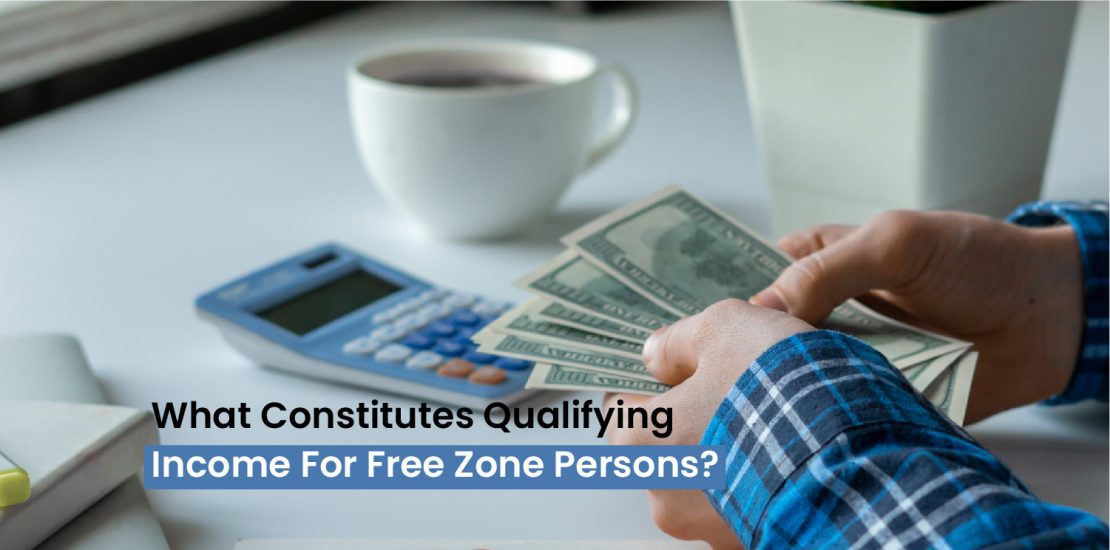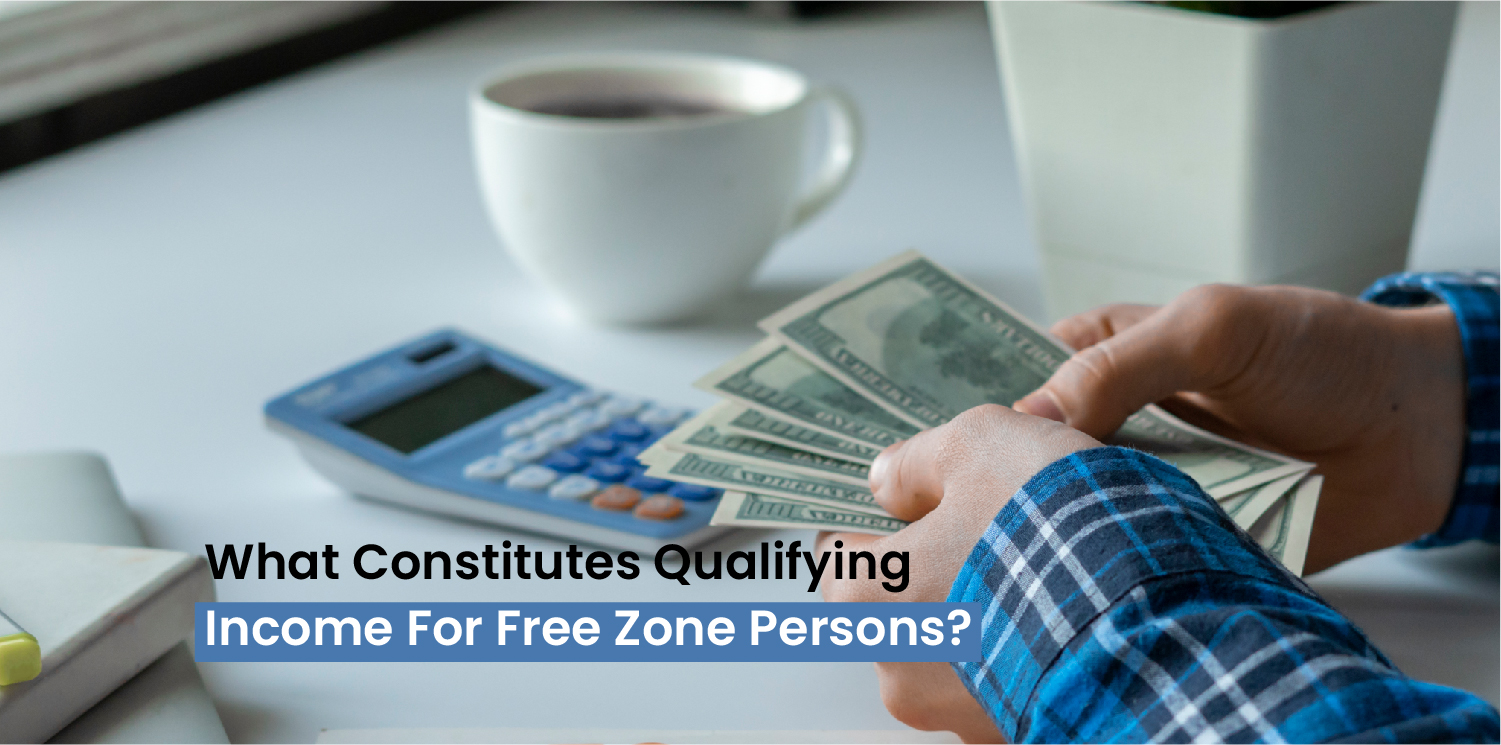What Constitutes Qualifying Income for Free Zone Persons?
- October 2, 2023
- Posted by: admin
- Category: Free Zone

The UAE introduced its Corporate Tax Law (referred to as the CTL) in December 2022, under Federal Decree-Law No. (47) of 2022 on the Taxation of Corporations and Businesses. The CTL officially took effect on June 1, 2023. It imposes a primary corporate tax rate of 9% on income that exceeds AED 375,000.
After significant anticipation, the UAE Ministry of Finance issued Cabinet Decision No. 55 of 2023, titled “Determining Qualifying Income for the Qualifying Free Zone Person,” and Ministerial Decision No. 139 of 2023, titled “Qualifying Activities and Excluded Activities,” on June 1, 2023. These two decisions deal with how the Corporate Tax Law (CTL) applies to individuals in Free Zones. Specifically, they offer clear guidelines on when a Free Zone Person qualifies for taxation as a Qualifying Free Zone Person (QFZP).
What are Free Zones?
Free zones in the UAE are designated areas offering various incentives to attract foreign investors and promote economic growth. They provide tax advantages, 100% ownership, and simplified import-export procedures, making them highly desirable for businesses.
Free Zone Types
Regarding UAE Corporate Tax, a Free Zone Person (FZP) can fall into two distinct categories.
Qualifying Free Zone Person (QFZP)
A Qualifying Free Zone Person (QFZP) must fulfill specific conditions outlined in the tax regulations. Meeting these conditions enables a QFZP to access certain tax advantages, such as a 0% tax rate on qualifying income, as outlined in the legislation.
Non-Qualifying Free Zone Person (NQFZP)
A Non-Qualifying Free Zone Person (NQFZP) is a Free Zone Person (FZP) that doesn’t satisfy the particular conditions needed to be classified as a Qualifying Free Zone Person (QFZP). Consequently, an NQFZP might not have the same access to tax benefits or exemptions as a QFZP.
Tax Rates for Free Zone Companies
Corporate Tax will be applied to a Qualifying Free Zone Person at the following rates:
- 0% on Qualifying Income
- 9% on Non-Qualifying Income
Who Is Eligible To Qualify A Free Zone Person?
A Free Zone Person who satisfies each of the following criteria:
-
Satisfies Sufficient Substance in the UAE
To qualify as a Qualifying Free Zone Person, you should:
- Engage in primary income-generating operations within a Free Zone.
- Possess sufficient assets for conducting these operations.
- Employ an adequate number of qualified personnel to carry out these operations.
- Incur a satisfactory level of operating expenses for these operations.
-
Adhering to Arms Length and Transfer Pricing Regulation
Adheres to Arms-Length Transactions (Article 34) and Transfer Pricing (Article 55) as outlined in this Decree-Law.
-
Not Eligible for the 9% Tax Rate Application
The person whose taxable income does not exceed AED 375,000.
-
Fulfilling the Additional Requirements
Meet the requirements mentioned in Cabinet Decision No. 139 of 2023
Qualifying Income as defined in Cabinet Decision No. 55 of 2023
What is Included in Qualifying Income?
The concept of Qualifying Income is essential within the framework of UAE Free Zone tax regulations. It categorises Qualifying Income according to the nature of transactions and the parties involved.
Transactions with Other Free Zone Persons
Qualifying Income encompasses revenue generated from all transactions, excluding those originating from Excluded Activities. Essentially, as long as the activity is not excluded, income from transactions with other Free Zone entities is classified as Qualifying Income.
Transactions with Entities Outside the Free Zone
Qualifying Income comprises revenue generated exclusively from Qualifying Activities. If a transaction involves any Excluded Activities, the income derived from such activities will not be classified as Qualifying Income.
Income From All Other Transactions
This encompasses any additional earnings that a Qualifying Free Zone Person may acquire, as long as they meet the de minimis requirements. Typically, these requirements are related to thresholds or limits that determine whether the income can still be classified as Qualifying Income.
Please note that Qualifying Income excludes earnings obtained from a Domestic or Foreign Permanent Establishment (e.g., a branch of a free zone company in the Mainland or outside the UAE), income generated from immovable commercial property when dealing with Non-Free Zone Persons, or income from non-commercial property when dealing with either Free Zone Persons or Non-Free Zone Persons.
Qualifying Activities
Article 2(a) of the Qualifying Activities Decision provides the following definition for ‘Qualifying Activities:
- Manufacturing goods or materials.
- Processing goods or materials.
- Holding shares and other securities.
- Owning, managing, and operating ships.
- Providing reinsurance services subject to regulatory oversight by the competent authority in the UAE.
- Offering fund management services subject to regulatory oversight by the competent authority in the UAE.
- Providing wealth and investment management services subject to regulatory oversight by the competent authority in the UAE.
- Offering headquarters services to related parties.
- Providing treasury and financing services to related parties.
- Engaging in financing and leasing of aircraft, including engines and rotatable components.
- Distributing goods or materials within or from a Designated Zone to a customer that resells such goods or materials, or parts thereof, or processes or alters such goods or materials or parts thereof for the purposes of sale or resale.
Logistics services
The distribution of goods or materials must occur within or from a designated Free Zone, and any goods or materials entering the UAE must be imported through a designated Free Zone.
An activity is considered ancillary when it doesn’t serve an independent function but is essential for the execution of the main Qualifying Activity.
Excluded Activities
Article 3 of the Qualifying Activities Decision also provides a list of ‘Excluded Activities.’ Income generated from these Excluded Activities will be subject to a 9% tax rate (on taxable income exceeding AED 375,000), provided that the income surpasses the De Minimis Threshold (as defined below). Excluded Activities include:
- Any dealings with natural persons, excluding transactions related to the Qualifying Activities specified in paragraphs (d), (f), (g), and (j) of Article 2 of the Qualifying Activities Decision.
- Banking activities are subject to regulatory oversight by the competent authority in the UAE.
- Insurance activities are subject to regulatory oversight by the competent authority in the UAE, except for the activity specified in paragraph (e) of Article 2 of the Qualifying Activities Decision.
- Finance and leasing activities are subject to regulatory oversight by the competent authority in the UAE, except for those specified in paragraphs (i) and (j) of Article 2 of the Qualifying Activities Decision.
- Ownership or exploitation of immovable property, except for commercial property located in a Free Zone when the transaction involves other Free Zone Persons.
- Ownership or exploitation of intellectual property assets.
- Any activities that are ancillary to the activities listed in paragraphs (a) to (f) above.
Conclusion
As per Article 4 of the Qualifying Income Decision, a De Minimis Threshold is considered when a Qualified Free Zone Person generates income from either (i) Excluded Activities or (ii) activities that do not qualify as Qualifying Activities when the counterparty in the transaction is a Non-Free Zone Person (resulting in Non-Qualifying Revenue). If, during a relevant tax period, the Non-Qualifying Revenue of a Qualifying Free Zone Person exceeds the lower of the two De Minimis Thresholds mentioned below, the Free Zone Person will no longer be considered a Qualifying Free Zone Person:
- 5% of the total revenue; or
- AED 5 million in revenue.
If a Free Zone Person exceeds the De Minimis Threshold, they will lose their Qualifying Free Zone Person status for the present tax period and the following four tax periods. They will then be subject to a 9% tax rate on all taxable income exceeding AED 375,000.



